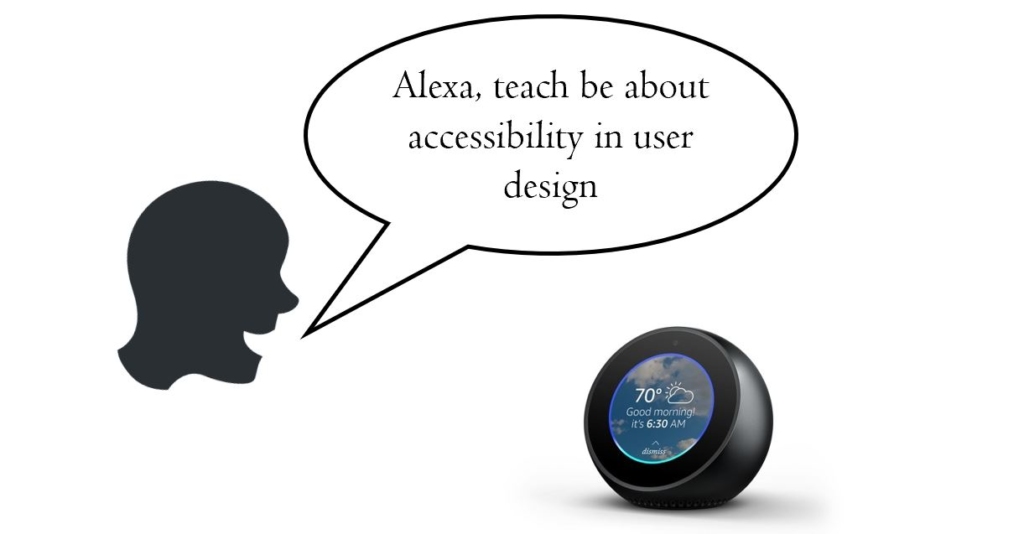Virtual Assistants have become part of our everyday life. AI robots like Alexa and Siri are revolutionizing the way we communicate with our smart devices. However, what many might not realize is the impact of this technology when it comes to accessibility. This blog post will provide another perspective to these emerging AI robots.

I was eating breakfast one morning while listening to Amazon’s “Alexa” giving me the latest news brief. I was in the process of deciding what to talk about in an upcoming presentation on accessibility and usability, and as I was too lazy to reach up and get my computer from across the room to do some research, I decided to ask Alexa to tell me something about accessibility in user design. That is when I realized that the Alexa device itself is actually a great example of a revolutionizing invention within accessibility.

So what is it? Most people have probably heard of virtual assistants by now, and a lot of people also have this technology in their phones, in the form of e.g. Apple iPhone’s “Siri”. They are AI-driven robots which can provide information and help with a wide variety of tasks, such as answering to commands like ”what time is it?”, “solve this mathematical problem”, “play me some music”, “give me the latest news”, and so forth. These are all tasks which, before, would have required a computer screen in order to perform. Considering the possibility of speaking with the computer in order to retrieve information, there is no doubt about the benefits this invention generates in terms of accessibility within usability.
Before, I would often think of virtual assistants as some excess technology product which would make life a bit more comfortable for lazy people like myself. However, this is quite a selfish reasoning when considering the great use that these AI-robots pose for a lot of people. Such as people with refractive errors, who are not able to read the news on a desktop, or elderly people who are having a hard time adapting to an advanced smartphone. Instead, they can just ask their virtual assistant for the information or task they are seeking, hence eliminating usability barriers.
Not only do these virtual assistants facilitate the information seeking process for disabled or elderly people. They could also enhance internet connectivity for people living in developing countries, which has been pointed out by Forbes. The virtual assistants are a lot cheaper than desktop computers and smartphones, and there is no need for the user of being able to read or write. This shows once again how these virtual assistants can eliminate barriers when it comes to accessibility.
While most of the well-known commercial virtual assistants are not known mainly for being an accessibility tool, one company which has targeted people with physical disabilities is Tecla. One of their recent devices, the Tecla-e, can be built into a wheelchair, allowing people to operate their other smart devices, or retrieve information, directly through speaking to their wheelchair. Furthermore, Tecla states that virtual assistants are one of the four most important trends within assistive technology.
Conclusively, virtual assistants are great examples of technology that serves a purpose for which it might not have been initially intended for, and a good example of how general technology can improve our society. Of course, there are concerns about this technology, as with a lot of new technology, for example when it comes to privacy matters. However, setting the concerns aside, these AI robots serves a great purpose in the mission for providing inclusive design and accessibility for all people.
References:
McCormick, M. (2019, Mars 11). Hey Siri! Could Virtual Assistants Be The Missing Link In Internet Accessibility? Retrieved: https://www.forbes.com/sites/meghanmccormick/2019/03/11/hey-siri-could-virtual-assistants-be-the-missing-link-in-internet-accessibility/#772f7a7666fe
Medeiros, J. (2018, April 19). Voice Assistants are Changing How Users with Disabilities Get Things Done [Blog Post]. Retrieved: https://www.modev.com/blog/voice-assistants-are-changing-how-users-with-disabilities-get-things-done
Robert, J.D. (2017, November 17). Voice Assistants for Accessibility: Siri, Google Assistant, Cortana, Alexa, and Bixby [Blog Post]. Retrieved: https://gettecla.com/blogs/news/voice-assistants-accessibility